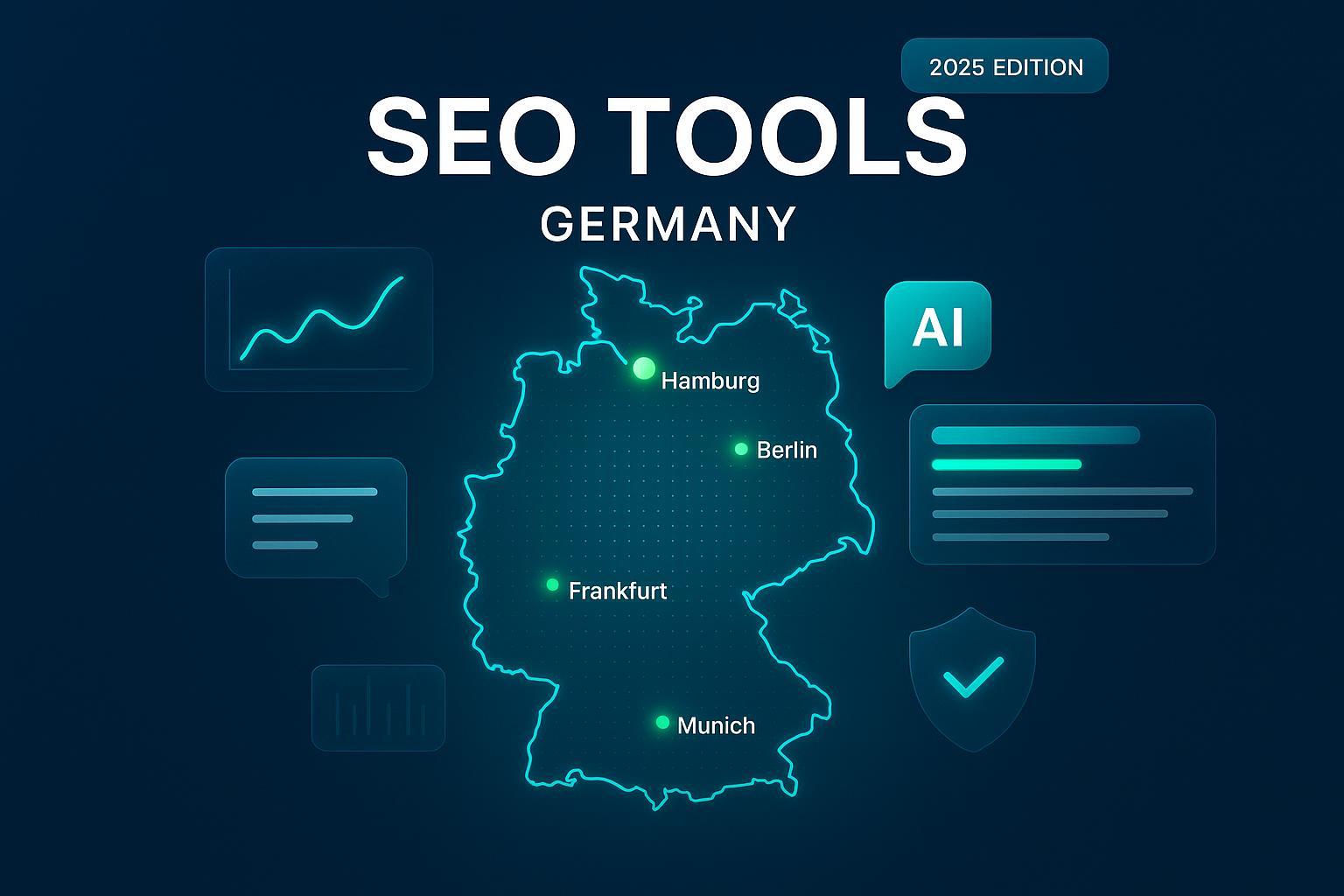Best AI SEO Tools in Germany (2025 Edition)

If you do SEO for the German market in 2025, your playbook is changing fast. Google’s AI Overviews rolled out in Germany in March 2025, reshaping how clicks flow and how brands show up in answers above the classic blue links, as reported by Heise in “AI search: Google brings AI Overviews to Germany” (2025) and companion explainers on features and impact. See the context in German tech coverage by Heise on AI Overviews in Germany (2025) and practical guidance summarizing the rollout timelines and expected traffic shifts from SE Ranking’s AI Overviews brief (2025).
That shift puts Generative Engine Optimization (GEO) and Answer Engine Optimization (AEO) squarely on your roadmap—optimizing content to be citable, credible, and structured so AI systems can surface it. A Germany-specific lens matters: language nuance, local SERP behavior on Google.de, and GDPR expectations.
How we chose these tools
- Strong German data: reliable keyword, SERP, and competitive datasets for Germany.
- 2025-ready AI: features that help with GEO/AEO, content briefs, entity coverage, and machine-readable structure.
- German language support: high-quality NLP and optimization in German.
- Compliance awareness: clear privacy practices; note that we only cite verifiable, official sources when discussing GDPR and hosting.
- Fit for common German workflows: agencies, SMEs, e‑commerce, and in-house teams.
Quick note on terms
- GEO/AEO: Tools and tactics to improve visibility in AI Overviews and other answer engines. For a Germany-oriented deep dive into platforms tracking AI answers and GEO readiness, see the internetwarriors AIO & GEO Platforms Report (2025).
1) SISTRIX — Gold-standard visibility for German SERPs
Why it stands out
- SISTRIX invented and popularized the Visibility Index, a benchmark metric for organic visibility by country that’s widely used in DACH. See the official SISTRIX Visibility Index explainer.
- Clear, country-specific tracking on Google.de: ideal for German competitor benchmarking and trend diagnostics. SISTRIX details methodology and use cases in their Visibility Index handbook pages.
Best for
- Agencies and in-house teams that need reliable, long-term visibility benchmarks in Germany.
Tips for 2025
- Layer your Visibility Index monitoring with AI answer visibility tracking from specialized GEO tools (see the internetwarriors report above) to catch shifts that classic rankings won’t show.
GDPR note
- SISTRIX operates under EU law as a German company. For specific data processing practices, consult SISTRIX’s official privacy resources and data protection posts such as the company’s discussion of EU–US data agreements in the SISTRIX blog (2023+).
2) Ryte — Technical SEO and compliance-first site quality for DACH
Why it stands out
- German-born platform focused on website quality, crawlability, and on-page health—key foundations for GEO/AEO.
- Clear legal presence and policy governance; see Ryte GmbH’s imprint with company details in Munich via the official imprint page and their privacy framework in the Ryte privacy policy.
Best for
- German SMEs and enterprises needing robust technical audits with clear governance hygiene.
Tips for 2025
- Use Ryte to identify structured data gaps and indexation issues—both impact how AI systems extract and trust your content.
3) Seobility — German-made, practical all-round SEO suite
Why it stands out
- Built in Germany, with straightforward tools for audits, rank tracking, and on-page optimization—good for SMEs.
- Company footprint in Nuremberg (Bavaria) is public; see Seobility GmbH company details via industry listings and official pages such as Seobility GmbH company overview and external registry references.
Best for
- Budget-conscious German teams wanting a simple, compliance-aware toolkit.
Tips for 2025
- Pair Seobility’s audits with an editorial workflow tool to convert fixes and recommendations into production-ready content quickly.
4) Searchmetrics — Enterprise SEO rooted in Berlin
Why it stands out
- German-founded and enterprise-focused, with deep competitive research and content intelligence. Company HQ details are in Berlin-based profiles like Dealroom’s Searchmetrics listing.
Best for
- Larger organizations and agencies needing international + German depth with enterprise reporting.
Tips for 2025
- Use topic and entity analysis to ensure your German content aligns with how AI systems assemble answers for complex queries.
5) XOVI — Established German suite for rankings and reporting
Why it stands out
- Longstanding German SEO platform used by local marketers; privacy and DPA documentation are publicly available on the XOVI privacy policy and XOVI DPA.
Best for
- SMBs and agencies that want an accessible German interface with standard SEO modules.
Tips for 2025
- Track post–AI Overviews volatility by segmenting monitored keywords into “answer-prone” vs “classic” intents.
6) Semrush — Massive keyword data with a dedicated Germany database
Why it stands out
- Germany is one of Semrush’s core country databases with historical data back to 2012. See Semrush country coverage and historical data notes.
- Broad toolset for content, technical, and competitive research—useful for German and cross-border campaigns.
Best for
- Teams that need a global stack but care strongly about German datasets.
Tips for 2025
- Build briefs that emphasize entities and FAQs likely to trigger AI Overviews and rich answers on Google.de.
7) Ahrefs — Deep international database coverage including Germany
Why it stands out
- Extensive keywords coverage across 200+ regions, with robust data for Germany and detailed SEO metrics. See Ahrefs’ overview of SEO metrics including country selection in Ahrefs Academy.
Best for
- Link-driven strategies and content gap analysis across German competitors.
Tips for 2025
- Combine Ahrefs’ competitive gaps with entity-rich outlines to increase your chances of being cited by AI systems.
8) Surfer — German-language AI briefs and NLP optimization
Why it stands out
- Surfer supports German in its AI content and Content Editor workflows. See Surfer’s official language and location support documentation: Surfer language/location support and platform details on Surfer AI.
Best for
- Writers and SEO teams producing German articles at scale with on-page NLP guidance.
Tips for 2025
- Use Surfer’s facts/language features to inject locally relevant data and terms that align with German user intent.
9) Clearscope — German content optimization with proven outcomes
Why it stands out
- Clearscope supports German for content reports and keyword discovery; see the official language support page: What languages does Clearscope support?.
Best for
- Teams that need a clean, writer-friendly editor for German content briefs and optimization.
Tips for 2025
- Validate German intent with native examples; pair Clearscope’s suggestions with editorial judgment to avoid over-optimization.
10) Frase — Multilingual AI briefs and draft generation for German
Why it stands out
- Frase offers multilingual workflows and guides on optimizing for SEO and GEO together; see the Frase help center note on optimizing for SEO and GEO and settings for language & country targeting.
Best for
- Lean teams producing research-backed drafts in German that are quickly refined for AEO.
Tips for 2025
- Create German SERP-based outlines first, then use Frase’s AI to draft. Edit heavily for tone, examples, and compliance.
11) SE Ranking — Rapidly growing German keyword database
Why it stands out
- SE Ranking publishes ongoing updates about database expansion, including major boosts to Germany. See their rolling major updates page and competitive research announcements.
Best for
- Price-sensitive teams that still need substantial German keyword and competitor data.
Tips for 2025
- Use SE Ranking’s country filters to isolate .de competitors and spot AI-Overview-influenced shifts in estimated traffic.
12) Yext — Tracking brand presence across AI search and traditional search
Why it stands out
- Yext introduced “Yext Scout,” an AI-powered search and competitive intelligence agent that tracks presence across traditional engines and AI platforms (ChatGPT, Gemini, Perplexity, etc.). See the 2025 overview in Street Fight’s report on Yext Scout and Yext’s own thought leadership on AI search shifts like Google’s AI Mode and answer engines (2025).
Best for
- Multi-location brands and enterprises in Germany needing AI-era visibility and competitive insights.
Tips for 2025
- Use insights to prioritize content and listings signals where AI assistants pull answers for local German queries.
13) QuickCreator — Fast German AI content production with SEO scaffolding
Why it stands out
- QuickCreator combines AI drafting, block-based editing, automatic SEO optimization informed by SERP analysis, and one-click WordPress publishing—useful for German teams that need speed without sacrificing structure. Explore features at QuickCreator.io.
- Collaboration, multilingual generation, and integrated media help teams keep pace with frequent GEO-oriented updates.
Best for
- Agencies and SMEs that want an all-in-one AI blogging stack with minimal setup and built-in SEO hygiene.
Tips for 2025
- Build a German editorial pipeline: keyword → SERP analysis → AI briefs → human edits → schema-ready publish. QuickCreator’s hosting and analytics can help you iterate quickly on topics most likely to surface in AI Overviews.
Practical playbooks for German teams in 2025
- Track both classic rankings and AI answer visibility: Traditional rank tracking (e.g., SISTRIX, Semrush, Ahrefs) won’t capture all of the AI Overviews impact. Supplement with GEO monitoring from specialized tools highlighted in the internetwarriors AIO & GEO Platforms Report (2025).
- Optimize for machine-readability: Clean HTML structure, comprehensive FAQs, and robust schema boost your chances to be cited in answers. Align content with entity coverage implied by your topic cluster tools.
- Localize beyond translation: German examples, pricing, and references improve trust and relevance for AI systems trained on local sources.
- Tight compliance hygiene: Keep consent and privacy notices in order; link up with your legal and analytics teams to avoid accidental data leakage in AI-assisted workflows.
GDPR and data residency: buyer’s checklist
We do not speculate on undocumented hosting details. Instead, verify these items directly with each vendor:
- Data Processing Agreement (DPA) availability and sub-processor list.
- Storage location options (Germany or EU) and data export controls.
- Access controls for AI features; retention periods for user-provided prompts or content.
- Consent/cookie compliance guidance for scripts and widgets.
- Imprint and privacy policy alignment with German legal norms.
Notable reference points
- XOVI provides both a public privacy policy and a DPA: XOVI privacy policy and XOVI DPA.
- DeepL, a German AI company often used in multilingual workflows, outlines strict GDPR-aligned processing and a Pro plan that doesn’t store texts; see DeepL Pro data security and Pro privacy info.
How these tools work together (example stacks)
- SME content engine (German market):
- Research: Semrush or Ahrefs for German keywords; SISTRIX for visibility trends.
- Draft + optimize: QuickCreator for briefs/drafts and publishing; Surfer or Clearscope to refine German NLP coverage.
- Monitor GEO: Add a GEO tracker (per internetwarriors’ 2025 report) to watch answer engine presence.
- Enterprise + multi-location:
- Research + monitoring: Searchmetrics plus SISTRIX; Yext for AI/traditional presence tracking.
- Production: QuickCreator or in-house CMS; Frase for outline automation in German; technical checks with Ryte.
FAQs
Q: What changed in 2025 for German SEO?
A: Google rolled out AI Overviews in Germany in 2025, introducing AI-generated summaries that can reduce classic organic clicks for some queries. See the coverage by Heise (2025) and practical notes from SE Ranking’s AI Overviews brief (2025).
Q: How do I measure success beyond blue links?
A: Track visibility indices (e.g., SISTRIX) and add GEO monitoring to assess inclusion in AI-generated answers. The internetwarriors AIO & GEO Platforms Report (2025) provides a current map of relevant tools.
Q: Which tools have strong German language support for on-page optimization?
A: Surfer and Clearscope confirm German support in their documentation—see Surfer language/location support and Clearscope language support. Frase also details multilingual settings for German targeting in its help docs.
Q: How should teams think about GDPR when using AI SEO tools?
A: Request a DPA, confirm EU data residency options where needed, and check retention policies for AI features. As an example of transparent documentation, see XOVI’s privacy policy and DPA. For translation workflows, DeepL Pro’s data security clarifies non-storage for subscribers.
— If you want a fast, collaborative way to produce German content with SEO scaffolding built in, try QuickCreator’s AI-powered editor and one-click WordPress publishing at QuickCreator.io.

